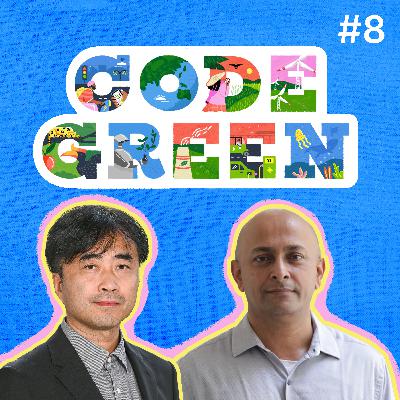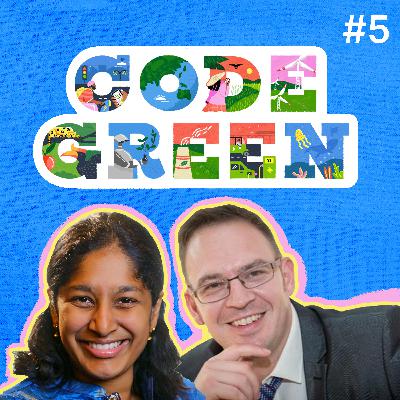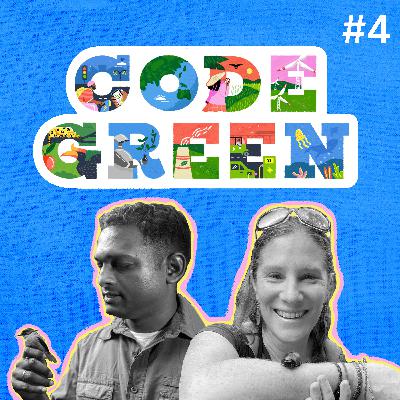Discover Code Green
Code Green

Code Green
Author: Digital Futures Lab and Earth Venture Foundation
Subscribed: 0Played: 1Subscribe
Share
© Digital Futures Lab and Earth Venture Foundation
Description
A monthly dispatch and expert-led podcast series exploring the intersection of AI and Climate Action in Asia.
Brought to you by Digital Futures Lab, in collaboration with Earth Venture Foundation.
Brought to you by Digital Futures Lab, in collaboration with Earth Venture Foundation.
12 Episodes
Reverse
In this bonus episode of the Code Green podcast, team members Dona, Meredith & Tammanna reflect on the season. They discuss the project's origins & their experiences of curating the podcast & newsletter. Their key takeaways include the need for nuance in discussions about AI's environmental impact, & questioning the focus on hyper-growth & efficiency. They emphasise the importance of situated understanding, participatory methods, & addressing the underexplored lens of abandoned technology infrastructure. Looking ahead, they express interest in exploring critical minerals & AI in India, & the intersection of AI & conservation.SpeakersDona Mathew is a lawyer with experience in public policy research & legislative drafting. At Digital Futures Lab, her work focuses on the ethical dimensions of data & AI, particularly at the nexus of climate action & legal institutions. She has been part of DFL’s AI & Climate Futures in Asia work with The Rockefeller Foundation. Since 2024, she has been leading research & coordinating efforts for the Code Green series.Meredith Stinger is a qualitative researcher & curator. As a consultant with Quicksand, she has worked on projects exploring the social dimensions of technology design & implementation. As a 2023 Fulbright-Nehru Student Research Fellow, she conducted ten months of ethnographic fieldwork in India, examining the social & political implications of the Aadhaar digital identity system. Her research has focused on exploring the materiality of digital systems & what these practices reveal about power, access & belonging in the digital age. She is particularly interested in the intersection between official technology policy discourse & lived experiences, focusing on how communities adapt to & navigate emerging digital systems.Tammanna Aurora is a lawyer, researcher, & curator interested in spaces where questions of art, law, policy, climate, & technology meet. Her work explores the role of qualitative data, stories, & lived experience in decision-making within formal legal & scientific frameworks. She currently works on When The Earth Testifies with Agami, leads a fellowship for law students called SOCH, & is building temp.mag, an interdisciplinary research + media studio. You can read the transcript for this episode here.Show NotesAI for Climate Action Innovation FactoryAI-for-climate grand challengeTexas residents urged to take shorter showersMistral AI’s lifecycle analysis of AI modelsUNDP in Asia & the Pacific launches ‘Una’ICRISAT & Partners launch AI-powered climate advisory initiative to boost farmer resilienceAI supply chain threatens climate progress in East AsiaResponsible AI Strategy for the EnvironmentClimate Change & AI: Recommendations for GovernmentThree Mile Island Nuclear Reactor to restart to power Microsoft AI operationsEpisode 06: Material AI & the mineral supply chain with Tom & TamaraIssue 01: The State of (power) PlayHungry thirsty data centresGeoAI meets Climate ActionIzni’s paper on modelling public social values of flood-prone land use using the GIS application SolVESEp 04: AI & biodiversity conservation in Asia with Eleanor & RobinEp 03: Cutting through the hype of AI for climate action with Cindy & SherifEp 05: AI & energy transitions in Asia with John & PriyaEp 08: Locating sust(AI)nability in the smart city with ChengHe & RajEp 02: Agriculture 4.0 & the future of Asia’s farmers with Anubha & NethAgriculture & weather forecasting case study“No more false solutions!”Episode 09: Funding&framing Asia’s climate futures with Hanyuan & Luis FelipeWhat’s going on with China’s ghost cities?The invisible seafaring industry that keeps the internet afloatAbandoned solar farmsJust good enough dataCreditsAudio Editing: Creator Studio Goa by Winfluence MediaProduction Support: Shivranjana Rathore & Dona MathewAttributionsIntro & Outro: Retro Sounds, Alban_GoghTransitions - Meditative Background Music, white_records
Across this series, we’ve traced the many emergent tensions between AI as both a potential solution and barrier to addressing the world’s most urgent climate and environmental dilemmas. In this final episode, Hanyuan ‘Karen’ Wang and Luis Felipe R. Murrillo discuss the complex arena of climate finance - highlighting these key tensions and potential pathways forward. Hanyuan discusses the need for tools for businesses to navigate the complex climate policy landscape, and the role of private-sector involvement. Luis highlights the difficulties of collecting quality climate data, the importance of data stewardship in bridging the gaps between experts and community needs, and the potential of ‘commoning’ as a way to envision alternate, sustainable frameworks and funding models. SpeakersHanyuan ‘Karen’ WangCEO and Founder, ClimindClimind is a platform that delivers actionable climate data infrastructure through AI technologies to facilitate mitigation and adaptation solutions. Hanyuan (Karen) Wang is the first Chinese female to be selected as a Young Leader for the SDGs recognized by the United Nations. Additionally, she serves on the board of NGOs globally, including being the youngest Board of Directors for the Foundation for the Museum of the United Nations - UN Live. She is also on the Advisory Board Members of AI Hong Kong. Karen was a research assistant at Imperial College London's Centre for Climate Finance and Investment (CCFI), where her work centers on voluntary carbon markets, climate risks, and nature-based solutions with a particular focus on the Asian Market . She was named to Forbes' 30 Under 30. She went to Hong Kong Baptist University, Imperial College London, and is a Schwarzman Scholar from Tsinghua University.Luis Felipe (LF) R. MurilloAssistant Professor of Anthropology at University of Notre DameLuis Felipe R. Murillo’s work is primarily dedicated to the study of the intersections between computing and politics from an anthropological perspective. Based on long-term, collaborative ethnographic research, his research explores questions of commoning and anti-commoning in science and technology. Across several projects spanning hacker networks in the Pacific Rim to open technology development at CERN, LF's work investigates how underground computing collectives design and implement digital technologies in response to pressing social, political, and environmental issues. He is the author of Common Circuits: Hacking Alternative Political Futures recently published by Stanford University Press.You can read the transcript for this episode here.Show NotesSir Jim SkeaOslo Energy ForumJapan 2011 DisasterNew Expert Eyes Over Fukushima: Open Source Responses to the 3/11 Disaster in Japan Community Office Navigating the New Arctic (NNA)Camera Traps in Code Green Call of the W(AI)ldSingapore Carbon TaxSaudi Green InitiativeHKU Jockey Club Enterprise Sustainability Global Research InstituteICLR 2025illuminem ESG trackerISSB's new standardSustainability and Climate Risk by GARP Hong Kong Science & Technology ParkHong Kong ESG standards and IndexSEEKCommonsCheck out the Code Green glossary for more terms.This podcast series is accompanied by a monthly newsletter - sign up for updates here. For more about this project, visit our website codegreen.asiaCreditsAudio Editing: Creator Studio Goa by Winfluence MediaProduction Support: Shivranjana Rathore and Meredith StingerCover Design: Nayantara SurendranathAttributionsIntro and Outro: Retro Sounds, Alban_GoghTransitions - Meditative Background Music, white_records
Amidst rapid urbanisation, Asia’s urban centres are increasingly turning to smart solutions as they grapple with worsening air pollution, rising emissions, and erratic weather patterns. What role can data and AI play in shaping more sustainable urban futures? In this episode, ChengHe Guan and Raj Cherubal discuss the future of digital urban transformation, with a focus on smart and sustainable city initiatives in China and India. ChengHe explores how urban sensing techniques and fine-grained data analysis can shed light on pathways to more responsible and inclusive cityscapes. Raj draws on his experience as former CEO of India’s flagship Smart City project in Chennai, revealing the ground-level complexities at the intersection of city systems and climate resilience, as well as the potentials of AI and digital tools for institutional capacity and urban planning. Together, they emphasise that while data and AI are potentially valuable tools, they must be guided by thoughtful policy and inclusive design. They call for the consideration of societal behaviour in planning, stronger global partnerships and cross-disciplinary knowledge sharing to avoid redundant efforts and co-create cities that are equitable, safe, and accessible for all.You can read the transcript for this episode here.SpeakersChengHe GuanDirector of the Shanghai Key Laboratory of Urban Design and Urban Science, Assistant Professor of Urban Science and Policy, NYU Shanghai; Global Network Assistant Professor, Wagner Graduate School of Public Service, NYU ChengHe Guan is an Assistant Professor of Urban Science and Policy at NYU Shanghai, Global Network Assistant Professor, and PhD Advisor at NYU Wagner and is the founding co-director of the Shanghai Key Laboratory of Urban Design and Urban Science. He is affiliated with the School of Engineering and Applied Sciences at Harvard University, the School of Ecology and Environmental Sciences at East China Normal University, and NYU Tandon School of Engineering. Additionally, he serves as a senior research consultant to the Centre on Migration, Policy and Society at the University of Oxford.Raj CherubalRaj was CEO of Chennai Smart City Ltd. for six years, the flagship initiative of the Government of India to improve city infrastructure and services. Earlier, he was Director-Projects at Chennai City Connect, a platform for industry associations and civic organisations. He has a background in computational physics, visualisation, telecom and finance. He has worked on projects in sustainable transportation, urban planning and integrated, multi-modal public transportation, solid waste management, urban water body restoration, sustainable financing of urban infrastructure, and redevelopment of business districts and regional planning. He has worked to promote decentralisation and good urban governance, as well as economic freedom for entrepreneurs in the informal sector. He holds a M.S. in Physics from the University of Louisville and a M.S. in Nuclear Engineering from the University of Michigan, Ann Arbor. Show NotesIndia Smart Cities GuidelinesUrban Metabolism TheoryFumihiko MakiThe Ian L. McHarg Center for Urbanism and EcologyDelineating urban park catchment areas using mobile phone data: A case study of TokyoCommand and Control CentreAI + Climate Futures in AsiaSP Services and the Energy Market Authority Electricity Saving PilotQuantum UrbanismUrban Climate Community Project100RC Resilience, C40 and ITDPPlastic OdysseyCheck out the Code Green glossary for more terms.This podcast series is accompanied by a monthly newsletter - sign up for updates here. For more on the project, visit codegreen.asiaCredits Audio Editing: Creator Studio Goa by Winfluence MediaProduction Support: Shivranjana Rathore and Meredith StingerCover Design: Nayantara SurendranathAttributionsIntro and Outro: Retro Sounds, Alban_GoghTransitions - Meditative Background Music, white_records
As population growth, motorisation, and climate change strain urban mobility in the Asian region, the design and delivery of transport services are becoming increasingly complex. Experts Huê-Tâm Jamme and Kris Villanueva-Libunao explore why cities need equitable, people-centred planning that accounts for existing mobility patterns and what barriers exist to implementing AI for mobility. Hue-Tam emphasises the role of political will in shaping new transport modes that should not only support networks of economic activity but also enhance urban vibrancy and local culture. Kris juxtaposes AI’s potential to improve traffic management, sustainability, and safety with the need for strong data governance and capacity building for equitable AI implementation in the region. Together, they advocate for stakeholders to view mobility infrastructure as systems that impact people’s economic, social and cultural lives.You can read the transcript for this episode here.SpeakersKris Villanueva-LibunaoCEO, SmartCT Kris R. Villanueva-Libunao is a leader in digital governance, AI policy, and smart cities including smart mobility. As Executive Director of SMARTCT-Philippines, she leads initiatives integrating AI and data-driven solutions into urban planning, leading projects such as the Smart LGU Assessment and Growth Map to optimise mobility and infrastructure in local governments. Her expertise in AI governance is underscored by her role as AI Country Lead Researcher for the United Nations International Telecommunication Union (ITU), where she advanced policies to enhance gender-sensitive AI adoption in Southeast Asia. Kris has authored publications, including “Artificial Intelligence Policies to Enhance Urban Mobility in Southeast Asia”, and co-developed the Philippine National Transportation Strategy. Huê-Tâm JammeAssistant Professor, Arizona State University Huê-Tâm explores the effects of new technologies on space and society, especially on how people move, work, shop, and socialize in cities, asking how we can shape urban spaces that are more livable, accessible, and equitable? Jamme has led projects on car-free living in the US, automated food vending in France, and the platform economy in Southeast Asia. Her research interests span mobility, retail, transit-oriented development (TOD), and public space. Through her theory of "productive frictions", she explains how motorbike mobility in Vietnam produces high opportunities for commercial and social interactions on city streets; and why the rapid adoption of cars and mass transit will likely reduce the level of urban productive frictions.. Show NotesTomtom Traffic Index 2019Global status report on road safety 2023JICA Philippines Annual Report 2023, JICA Roadmap for Transport Infrastructure for Metro Manila 2014Mobility over Air Quality Index (MAQI)Doing Urban Development Fieldwork: Motorbike Ethnography in Hanoi (2018)Informal transport in the PhilippinesClean Energy and Decarbonization in Southeast AsiaSingapore's 'AI Traffic System' set to tackle Phuket's congestion, A Smarter Way to Manage Mass Transit in a Smart CityJICA Survey Transit Oriented Development in Vietnam (2016)The production of new mobilities: a theoretical framework to the politics of mobility transitions Seoul Open DataDigital Adoption in the PhilippinesNational Strategic Transportation StrategySmart City Assessment and Roadmap Development ProjectCheck out the Code Green glossary for more terms.This podcast series is accompanied by a monthly newsletter - sign up for updates here.For more about this project, visit our website codegreen.asiaCreditsAudio Editing: Creator Studio Goa by Winfluence MediaProduction Support: Shivranjana Rathore and Meredith StingerCover Design: Nayantara SurendranathAttributionsIntro and Outro: Retro Sounds, Alban_GoghTransitions - Meditative Background Music, white_records
AI is often framed as the future of progress, but what fuels this revolution? Behind every data centre, semiconductor, and AI model lies a hidden world of resource extraction, geopolitical power struggles, and environmental destruction. In this episode, we dig into the raw materials powering AI—from rare earth mining to data centres sucking up water in drought-prone regions. Experts Tom Özden-Schilling and Tamara Kneese reveal the true cost of AI’s rapid expansion—its human and ecological toll—and why the conversation on sustainability must move beyond carbon footprints to the messy realities of global supply chains.You can read the transcript for this episode here.SpeakersDr. Tom Özden-SchillingTom Özden-Schilling is Presidential Young Professor of Sociology and Anthropology at the National University of Singapore. His first book, The Ends of Research: Indigenous and Settler Science after the War in the Woods, is an ethnography of environmental deregulation in western Canada, and its effects on Indigenous and settler researchers’ struggles to maintain long-term forestry experiments and sovereignty projects. Tom’s current project examines the social costs of green energy transitions through the emergence of new critical minerals research and development initiatives in the United States, Malaysia, and Australia. Before joining NUS, Tom was Assistant Professor of Anthropology at Johns Hopkins University.Dr. Tamara KneeseDr. Tamara Kneese directs Data & Society Research Institute's Climate, Technology, and Justice programme. Previously, she led Data & Society's Algorithmic Impact Methods Lab (AIMLab). Before joining D&S, she was lead researcher at Green Software Foundation, director of developer engagement on the Green Software team at Intel, and assistant professor of Media Studies and director of Gender and Sexualities Studies at the University of San Francisco. She is the author of Death Glitch: How Techno-Solutionism Fails Us in This Life and Beyond (Yale University Press, 2023). Tamara holds a PhD in Media, Culture and Communication from NYU.Check out the Code Green glossary for more terms.This podcast series is accompanied by a monthly newsletter - sign up for updates here. For more about this project, visit our website codegreen.asiaShow NotesMountain Pass Rare Earth MineAustralia's first rare earths processing plant opens in KalgoorlieNvidia: what’s so good about the tech firm’s new AI superchip? Value creation in the metaverse Crypto's Climate Impact: 8 Claims, Fact-CheckedIEA Electricity 2024 Report Ethereum's energy usage will soon decrease by ~99.95% Granbury Residents Sue Local Bitcoin Mine Over Health-Threatening Noise Pollution Boom and Bust: The Fight over Bitcoin Mining in New York StateMeasuring AI’s Environmental Impacts Requires Empirical Research and Standards A New Front in the Water Wars: Your Internet Use Air Pollution and the Public Health Costs of AI The women who made America’s microchips and the children who paid for it Controversial rare earths plant in fight for survival in MalaysiaBiden is scrambling for minerals. This U.S. cobalt mine just closed The Pilbara Crisis: Resource Frontiers in Western Australia The Data Annotation Industry in the Global SouthAI Governance in Malaysia Report | Khazanah Research Institute EU Artificial Intelligence ActData Centre Alley CreditsAudio Editing: Creator Studio Goa by Winfluence MediaProduction Support: Shivranjana Rathore, Meredith StingerCover Design: Nayantara SurendranathAttributionsIntro and Outro: Retro Sounds, Alban_GoghTransitions - Meditative Background Music, white_records
For many countries in Asia, pathways to clean energy transitions are complex with continued reliance on coal and legacy infrastructure, a rapidly urbanising economy, and a booming data centre industry. How can we ensure that AI adoption is both safe and sustainable while also fostering equitable energy transitions?
In this episode, we hear from John Cotton & Priya Donti on the enthusiasm of governments in Asia in using AI to improve the efficiency of energy systems & manage energy demand & supply. We discuss AI’s potential to help integrate renewable energy sources into the grid, challenges in the area, environmental impacts & ways to manage them, and the need to invest in capacity building & skill development.
You can read the transcript for this episode here.
Speakers
John Cotton
John Cotton is Senior Program Manager for the Southeast Asia Energy Transition Partnership, UNOPS with a demonstrated history of project development in energy transition, renewables, IT and mining industries. John is educated in the UK at Manchester and Sussex Universities with a B.Sc (Hons) in Mathematics, Software Engineering, and an M.Sc in Energy Policy, respectively.
John has been based in Southeast Asia for 20 years and has overseen projects ranging from EPC contracts for hydropower and solar projects, through policy analysis and recommendations for the multi-disciplinary energy transition challenges faced across the region. Before ETP, he was Climate Change Policy Officer at the British Embassy, Vientiane of Lao PDR, and draws on extensive experience from both the public and private sectors.
Priya Donti
Priya Donti is an Assistant Professor at MIT EECS and LIDS, whose research focuses on machine learning for forecasting, optimisation, and control in high-renewables power grids. Specifically, her work explores methods to incorporate the physics and hard constraints associated with electric power systems into deep learning workflows.
Priya is also the co-founder and Chair of Climate Change AI, a global non-profit initiative to catalyse impactful work at the intersection of climate change and machine learning. She received her Ph.D. in Computer Science and Public Policy from Carnegie Mellon University.
Show Notes
COP26: What Asia pledged, from China to Vietnam and Philippines
PT PLN Indonesia’s State Utility Company
A comprehensive overview on demand-side energy management towards smart grids: challenges, solutions, and future direction
Upgrading and Modernising the Java-Madura-Bali Electricity Control Centre
Renewable Integration - Energy System - IEA
Development of Vietnam Smart Grid Roadmap for period up to year 2030, with a vision to 2050
Review on Machine Learning for Sustainable Energy Systems
Aligning artificial intelligence with climate change mitigation (overview of the multi-faceted relationship between AI and climate)
Climate Change and AI: Recommendations for Government Action (Global Partnership on AI report)
French grid operator RTE
Learning to Run a Power Network challenge
SCADA/EMS
Electricity 2024 – Analysis - IEA
What Are Renewable Energy Certificates (RECs)?
Global Brands Say Future Orders at Risk Given Cambodia’s Increasing Coal Power
UNFCCC (United Nations Framework Convention on Climate Change)
Microsoft deal propels Three Mile Island restart
Tiny machine learning
OpenSynth - LF Energy
Check out the Code Green glossary for more terms.
This podcast series is accompanied by a monthly newsletter - sign up for updates here. For more about this project, visit our website codegreen.asia
Credits
Audio Editing: Creator Studio Goa by Winfluence Media
Production Support: Shivranjana Rathore, Tammanna Aurora, Dona Mathew, Meredith Stinger
Cover Design: Nayantara Surendranath
Attributions
Intro and Outro: Retro Sounds, Alban_Gogh
Transitions - Meditative Background Music, white_records
In this episode, Eleanor Slade & VV Robin discuss how technologies like AI have the potential to support conservation practices, yet challenges (data availability & financing) remain to realise some of these aspirations.On one hand, technology has facilitated public interest in nature. Using digital tools & apps, people can access info about diverse species & improve their understanding of their environments. On the other, the potential benefits of technology must not distract resources away from basic foundational research. AI can help in monitoring & processing large amounts of data, but investments are needed to ensure the next generation's familiarity with basic sciences & knowledge.With years of data collection, we're also at the point where we need to approach biodiversity data more thoughtfully-how much data do we really need? Would smaller datasets captured over shorter durations lead to the same kind of results? How do we minimise resource wastage? Eleanor & Robin discuss some of these key issues, situated in their unique practice areas in Singapore, Malaysia & India.You can read the transcript for this episode here.SpeakersEleanor Slade Eleanor is an Associate Professor at the Tropical Ecology & Entomology Lab at the Asian School of the Environment at Nanyan Technological University. Her research focuses on the challenges & opportunities associated with conservation, management, & restoration of tropical forests & human-modified landscapes. She's worked in the rainforests & oil palm plantations of Singapore, Malaysia, Sumatra, Philippines, Belize, & Brazil, & the woodlands & agricultural systems of Finland & the UK.She's currently also working on the AMBER project that's testing the use of automated camera & audio systems, combined with AI to deliver more standardised monitoring of insects, bats & birds; aiming to deploy a network of 40 biodiversity monitoring units over the next 2 years.Social Media: @eleslade.bsky.social / @teelab.bsky.socialVV Robin Robin is an Associate Professor at the Indian Institute of Science, Education, & Research (IISER) Tirupati. His work focuses on patterns & processes in ecology, behavioural ecology, biogeography & evolutionary ecology. He's interested in conservation initiatives involving multiple stakeholders & in collaborative research initiatives. He & his team use tools like bioacoustics, phylogenetics & population genetics, along with Remote Sensing & GIS to understand the relationship of birds with their habitats. Five years ago, he initiated a project to understand why birds found in some Western Ghats habitats didn't appear in others. It took him two years to analyse avian sound recordings collected over a year. He is of the opinion that AI could've helped him analyse this data in a year. His geography of work is the Western Ghats, Eastern Ghats & peninsular areas of India.Show NotesWarning of 'ecological Armageddon' after dramatic plunge in insect numbersCentre for Ecology and Hydrology in the UKThe Alan Turing InstituteAMBER: Unveiling AMBER: A Glimpse into Biodiversity Monitoring in Singapore using AI, Spotlight on moths in S’pore to assess impact of climate change, habitat loss on biodiversity, Scientists turn to AI and moths to assess health of ecosystemsSholicolaJerdon's CourserBirdNetMerlineBirdIPBES: Intergovernmental Panel on Biodiversity and Ecosystem Services ReportSoutheast Asian Rainforest Research Project (SEARP)Riparian Buffer ZonesAlternative Futures: AI & Climate in the Indian contextiNaturalistGlobal Biodiversity Information FacilityThis podcast series is accompanied by a monthly newsletter - sign up for updates here. For more, visit our website codegreen.asiaCreditsAudio Editing: Creator Studio GoaProduction Support: Shivranjana Rathore & Meredith StingerCover Design: Nayantara SurendranathAttributionsIntro & Outro: Retro Sounds, Alban_GoghTransitions: Meditative Background Music, white_records
Leaders at COP29 in Baku endorsed a declaration to use digital technologies and AI to address climate action, while also acknowledging the need to minimise its environmental impacts. How do we find this balance? Is it achievable at all? What new narratives and policy directions are needed? What does it mean for countries in Asia that are already grappling with the environmental impacts of rapid industrialisation? In this episode, Cindy Lin and Sherif Elsayed-Ali critique AI's scalability and environmental costs while urging interdisciplinary approaches to ensure meaningful impact. They advocate for realistic narratives, collective restraint, and context-specific innovations, highlighting the need to distinguish hype from scientifically proven use cases to achieve sustainable advancements.You can read the transcript for this episode here. SpeakersCindy LinCindy is an Assistant Professor at the School of Interactive Computing at Georgia Tech. An ethnographer and information scientist, her work centers on the data practices, exchanges, and expertise of climate change and their relationship to race and environmental governance in Indonesia and the United States. Prior to her professorship at Georgia Tech, she was assistant professor at the College of Information Sciences and Technology at the Pennsylvania State University. She was also a visiting postdoctoral fellow at Cornell Tech's Digital Life Initiative as well as a postdoctoral fellow at Cornell Atkinson Centre for Sustainability and Cornell's Department of Information Science. Sherif Elsayed-AliSherif is Executive Director of the Future of Technology Institute, where he brings unique expertise at the intersection of technology policy, entrepreneurship and human rights. He previously co-founded and served as CEO of Carbon Re, a joint spin-out of Cambridge University and UCL using machine learning to accelerate the decarbonization of foundational materials such as cement. Prior to this, he set up and led the AI for Climate practice at Canadian scale-up Element AI and was co-founder of Amnesty Tech. He was a World Economic Forum Global Future Council co-chair and a fellow at Harvard Kennedy School, both focusing on the intersection of technology and human rights. Show NotesConference of Parties 29 (COP29)COP29 Declaration on Green Digital ActionSchool of Interactive Computing, Georgia TechFuture of Tech InstituteCarbon ReAmnesty TechYale Program on Climate Change Communication - Climate Change in the Indonesian MindComputing Net ZeroPost-growth Human Computer InteractionDigital EnergeticsThis podcast series is accompanied by a monthly newsletter - sign up for updates here.For more about this project, visit our website codegreen.asiaCreditsAudio Editing: Creator Studio Goa by Winfluence Media Production Support: Shivranjana Rathore Cover Design: Nayantara SurendranathAttributionsIntro and Outro: Retro Sounds, Alban_GoghTransitions - Meditative Background Music, white_records
Climate change is disrupting agricultural practices, affecting food security and farmers' livelihoods. Technologies like AI-enabled precision agriculture are emerging as potential solutions to alleviate some of these problems. In Asia, where most farmers are smallholders and a digital divide persists, what are the implications of AI adoption for agriculture in the region? Can it help address the climate crisis or is it likely to exacerbate existing inequities?
In this episode, we deep-dive into the opportunities, challenges and risks of using AI for agriculture and how it might impact climate change. For the most part, our speakers are sceptical about the use of AI for agriculture, highlighting that it may not be what farmers need and ultimately serves narrow commercial interests. If we are to use AI for agriculture, we need to resist the fail-fast logic that dominates the start-up industry and invest the time and resources to engage with farming communities and understand their needs and social context.
You can read the episode transcript here.
Speakers
Anubha Singh
Anubha is a PhD candidate at the School of Information at the University of Michigan with a graduate certificate in Science, Technology, and Society. Through long-term ethnography of the onion supply chain in Western Maharashtra, she studies how data-driven technologies are restructuring farming and redefining the future of agriculture in India. Her work is informed by and contributes to the fields of Postcolonial and Feminist Science and Technology Studies, Ethnography of Computing and Agriculture, and Critical Cultural Studies.
Elenita ”Neth” Daño
Elenita, also known as Neth, is the Asia Director of the ETC Group that works to address the socioeconomic and ecological issues surrounding new technologies that could have an impact on marginalised communities. Neth is a researcher who has done in-depth analysis and published work on various issues in agriculture and climate change as well as technological divides, in developing countries, particularly in Southeast Asia. She has represented environmental non-governmental organisations in the Advisory Board to the Climate Technology Centre and Network (CTCN), the operational arm of the Technology Mechanism of the UNFCCC. She was appointed by the UN Secretary-General in the 10-member Group that supports the Technology Facilitation Mechanism (TFM) in 2016-2017.
Show Notes
A commentary on agricultural digitalisation for climate action in the Philippines. Page 17. Expert brief authored by Elenita Dano for the AI + Climate Futures in Asia Project.
The Green Revolution is a warning, not a blueprint for feeding a hungry planet
Digital Agriculture Mission: Tech for Transforming Farmers’ Lives Agristack and digital registry of farmers in India
Digital India
Indian Government Seed Fund Scheme for Start-up Prototypes
The Politics of Manmohanomics 1991 Economic Liberalisation in India
Agriculture sector has done well, needs ‘re-orientation’
Code Green
A commentary on agricultural digitalisation for climate action in the Philippines. Page 14. Expert brief authored by Elenita Dano for the AI + Climate Futures in Asia Project.
Philippine Rice Research Institute
Indian farmers rack up carbon credits with climate-conscious ways
OpenAI CEO Altman says at Davos future AI depends on energy breakthrough
Report: Thinking about using AI? Green Web Foundation
Data centre water consumption | npj Clean Water
The Battle Over Semiconductors Is Endangering Taiwan
This podcast series is accompanied by a monthly newsletter - sign up for updates here.
For more about this project, visit our website codegreen.asia
Credits
Audio Editing: Creator Studio Goa by Winfluence Media
Production Support: Shivranjana Rathore and Meredith Stinger
Cover Design: Nayantara Surendranath
Attributions
Intro and Outro: Retro Sounds, Alban_Gogh
Transitions - Meditative Background Music, white_records
Geospatial AI is the use of AI-based tools for analysing any type of geographic information derived from sources such as satellite imagery, aerial drones, and geographic information systems (GIS). These technologies can be employed in resource management, disaster response, and conservation efforts, offering real-time monitoring and analysis of ecosystems and natural resources.
In this episode, we explore the potential and limitations of using Geospatial AI for climate action. The conversation ranges from trends in democratisation of map-making with easy-to-use GIS tools to the risks and ethical concerns that are associated with the use of GIS data. Our guests discuss the need for community involvement, factoring in local knowledge systems, and ensuring equitable access when it comes to Geospatial AI. They discuss the potential environmental costs and the importance of funding and transparency in technology implementation.
You can read the transcript for this episode here.
Speakers
Cathy Richards
Cathy is the Associate for Digital Resilience and Emerging Technology at The Engine Room. Recently, as a Green Web Fellow, she investigated the benefits, ethical questions, and security risks associated with using GIS for environmental justice. Cathy holds a Bachelor's degree in International Relations from Boston University and an MPA from the Monterey Institute of International Studies. She is from Costa Rica.
Izni ZahidiIzni is a Civil Engineering academic at Monash University, Malaysia and has over 16 years of academic and industry experience. Her primary research is in using remote sensing, GIS, and modelling to develop sustainable and climate-resilient communities. Her research team assesses environmental risks such as flooding, water pollution, vegetation degradation, and urban heat island effect to improve natural resources management. Her research work has won a Gold Award, Silver Award, and Special Award as selected by the Toronto International Society of Innovation and Advanced Skills in the international competition, Sustainability in Civil Engineering Exhibition and Competition.
Show Notes
Geospatial AI or Geo AI (glossary term)
ArcGIS, Esri’s enterprise geospatial platform
QGIS, a free and open-source platform
Felt Maps, a cloud-native platform
Artificial intelligence for predicting urban heat island effect and optimising land use/land cover for mitigation: Prospects and recent advancements, research paper co-authored by Izni Zahidi
Modelling public social values of flood-prone land use using GIS application SolVES, research article co-authored by Izni Zahidi
Internet of Things or IoT (glossary term)
Tracking Amazon: How Neighbors Are Monitoring Pollution From New Delivery Hub
Wireless Sensors Could be Less Effective in Muddy Soil
How the “Internet of Cows” is Transforming Livestock Farming in Europe
Northern Kenya leads the way in the world's largest IoT conservation network
Semantic Analysis of Social Network Site Data for Flood Mapping and Assessment, research paper co-authored by Izni Zahidi
Green Web Fellowship
Navigating GIS, a guide by Cathy Richards
The RECONECT Project: Regenerating Ecosystems with Nature-based Solutions for Hydro-meteorological Risk Reduction
AI + Climate Futures in Asia
This podcast series is accompanied by a monthly newsletter - sign up for updates here. For more about this project, visit our website codegreen.asia
Credits
Audio Editing: Sharon Joseph and Shivranjana Rathore
Cover Art: Nayantara Surendranath/Pastelstew
Attributions
Intro and Outro: Retro Sounds, Alban_Gogh
The climate crisis has pushed parts of Asia past a tipping point, making urgent solutions critical. While tech solutions like AI-driven smart agriculture and energy management are emerging, there's little understanding of the extent of their adoption and impact. How will AI fare in contexts underscored by issues of digital divide, data challenges and financial gaps?In episode zero of the Code Green podcast, we speak to leading experts on the intersection of AI and climate action in Asia from a policy, technology and finance lens. Our guests highlight the many opportunities for AI in climate adaptation, environmental costs and pathways needed to ensure climate justice in the long run.SpeakersElina Noor, Senior Fellow, Asia Program, Carnegie Endowment for International PeaceElina's work focuses on developments in Southeast Asia, particularly the impact and implications of tech in reshaping power dynamics, governance and nation-building.She's been the director of political-security affairs and deputy director of the Washington DC office at the Asia Society Policy Institute; and associate professor at the Daniel K. Inouye Asia-Pacific Center for Security Studies in Honolulu.Elina has spent most of her career at the Institute of Strategic and International Studies Malaysia, last as director, foreign policy and security studies. She was also with the Brookings Institution’s Project on US Relations with the Islamic World, and currently serves on the UN Sec-Gen’s Advisory Board on Disarmament Matters.Alpan Raval, Chief Scientist AI/ML, Wadhwani AIAlpan is a theoretical physicist, in the applied AI space for the last 24 years, applying ML to problems in computational biology and chemistry, queuing, computational advertising, online newsfeed optimisation and content moderation, public health, and agriculture.Alpan has led applied AI teams at LinkedIn and Amazon, worked as a researcher at D E Shaw Research; and taught mathematics and computational biology at the Claremont Colleges in California. He is the co-author of Introduction to Biological Networks (CRC Press). Varad Pande, Partner, Boston Consulting GroupVarad is a leader in BCG’s Climate & Sustainability and Social Impact practices with a focus on emerging markets. He is part of BCG’s Asia leadership team for social impact, climate finance, and adaptation and resilience. He has over 20 years of global experience as a senior ministerial advisor, an impact investor, and strategy consultant.Varad’s work has spanned UN Sustainable Development Goal domains such as financial inclusion, agriculture and livelihoods; and he has helped shape the global discourse on the role of digital public infrastructure (DPI) in accelerating the achievement of the SDGs.Varad was formerly a Partner at Omidyar Network India, and a partner and Asia Leader at Dalberg.This podcast is accompanied by a monthly newsletter - sign up here.Find the transcript here and visit codegreen.asiaCreditsAudio Editing: Sharon JosephProduction Support: Shivranjana RathoreAttributionsIntro, Outro - Retro Sounds, Alban_GoghTransitions - Meditative Background Music, white_recordsShow notesCheck out resources referenced in the episode:IEEE portfolio of AIS technology and impact standards and standards projectsInternational Standard on information Technology-Artificial Intelligence-Management SystemNikshay Platform for TuberculosisE-Sanjeevini for doctor-patient consultationPoshan Tracker for maternal and child healthWEF-BCG Project on Tech for Climate AdaptationFinancing Climate Adaptation and Resilience Is Good for Business and the WorldTransport Stack – Powering Innovation and Impact with Digital Public Infrastructure & GoodsGlobal Energy Alliance for People and PlanetIF-CAP by Asian Development BankPentagreenMalaysia Energy Transition Roadmap + FundDigital Futures Lab study on AI + Climate Futures in Asia (2023)
Welcome to Code Green! Brought to you by Digital Futures Lab, in partnership with Earth Venture Foundation, Code Green is a podcast and newsletter series that deep dives into the intersection of AI and climate-tech in Asia.
Cutting through the hype and silos of knowledge, Code Green will foster interdisciplinary knowledge exchange and surface voices from the ground.
Through this season and an accompanying monthly newsletter, we will showcase emerging climate AI research and provide a socio-technical perspective on the implications of adopting AI for climate action.
Sign up for updates here.
Credits
Audio Editing: Sharon Joseph and Shivranjana Rathore
Attributions
Intro and Outro - Retro Sounds, Alban_Gogh
Transitions - Meditative Background Music, white_records



















Data annotation is a crucial step in training AI models, and there are various types of annotation methods available. From simple bounding boxes to complex semantic segmentation, each method offers a unique way to label data for machine learning algorithms, for more information visit and read https://www.waybinary.com/types-of-data-annotation-for-ai-applications/ . The experience of using these annotation tools can be both challenging and rewarding, as it requires attention to detail and a deep understanding of the data being annotated. Overall, the variety of annotation types allows for flexibility in creating accurate and reliable AI applications.